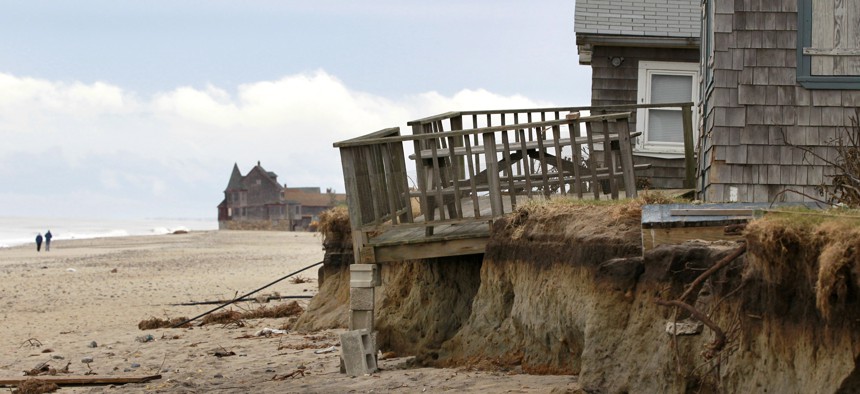States Seek to Keep Climate Change Lawsuit Out of Federal Court

In this Tuesday, Nov. 13, 2012 photo, cottages rest near an eroded shoreline on Roy Carpenter's Beach, in South Kingstown, R.I. AP Photo/Steven Senne

Connecting state and local government leaders
Thirteen states filed a brief this month hoping to keep a Rhode Island lawsuit against oil and gas companies in state rather than federal court.
Thirteen states have backed Rhode Island’s lawsuit seeking to hold oil companies accountable for the effects of climate change, arguing the case should remain in state rather than federal court.
Oil and gas companies named in the suit had previously argued that because the case involved federal interests, including longstanding energy and environmental laws, it should be heard in federal court.
The case, brought in 2018, was the first filed by a state that sought to hold oil and gas companies responsible for damages that climate change could inflict on local communities. Municipalities in Maryland, Colorado and California are also pursuing similar cases.
In each of these cases, the state or local governments are sparring with the companies over jurisdictional issues, striving to be heard in state courts, where experts said they stand a better chance of success.
In the first round of each of the four pending cases, courts have backed hearings in state court.
“Depending on how those go, by the end of the year, I think there will be a series of decisions that will define where these cases are going to be heard and how viable they are,” said Richard Wiles, executive director of the Center for Climate Integrity.
The National Association of Manufacturers has spoken out against the litigation, arguing that lawmakers, not the courts, should take up the issue.
“If the state really wants to do something about climate change, it should work with manufacturers on energy innovations, not target them for baseless litigation,” said Phil Goldberg, special counsel for NAM’s Manufacturers’ Accountability Project, in a prior statement on the case.
In 2018, two federal judges tossed climate change cases that moved to federal courts in New York and California.
In its case, Rhode Island makes state-law tort claims and seeks damages for local environmental harms it said have resulted from the oil companies’ production, marketing and distribution of fossil fuels. Using a similar strategy that states deployed against drug companies in opioid litigation, Rhode Island accuses companies including Chevron Corp., ExxonMobil and Shell of publicly concealing the threats posed by climate change when their own internal research acknowledged the devastating potential of global warming.
Rhode Island’s case was brought under an area of law that allows the state to prevent the pollution of public property and the state has argued its more than 400 miles of coastline will be severely impacted by the effects of climate changes, including rising sea levels.
In an amicus brief filed last week in the U.S. Court of Appeals for First Circuit, the 13 states backing the Rhode Island case argued allowing the case to be removed from state court “would work immeasurable damage to states’ guarded sovereign prerogative to pursue their state-law claims in state courts in environmental and non-environmental cases alike.”
Attorneys general from California, Connecticut, Delaware, Hawaii, Maine, Maryland, Massachusetts, Minnesota, New Jersey, New York, Oregon, Vermont, and Washington jointly filed the brief. The supporting states argue that federal law is not an “essential element” of any of Rhode Island’s claims.
“Corporations promoted the use of fossil fuels that accelerate climate change and hurt our coastal states,” said California Attorney General Xavier Becerra. “We support Rhode Island’s action to hold Big Oil accountable for its role in causing our climate crisis and for the costs of cleaning up the damage.”
The Center for Climate Integrity estimates it would cost Rhode Island $2.9 billion to safeguard communities in the state from chronic flooding by 2040. The cost to pay for adaptation measures across the country, including construction of seawalls and other defenses in coastal communities, could reach $400 billion, Wiles said.
Andrea Noble is a staff correspondent for Route Fifty.

NEXT STORY: Keeping track of vulnerability disclosures




